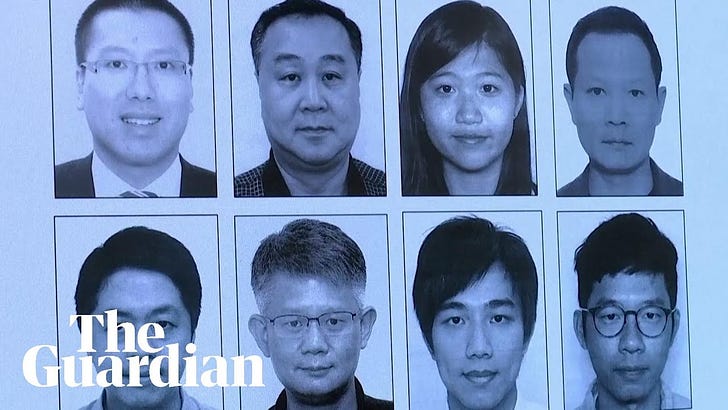Hello,
On Monday morning, the Hong Kong authorities issued eight separate HK$1 million rewards for information that leads to the arrests of ex-legislators Nathan Law, Dennis Kwok, Ted Hui, unionist Mung Siu-tat, lawyer Kevin Yam, and activists Finn Lau, Anna Kwok and Elmer Yuen. Condemnation from the British, Australian and United States swiftly followed. In the UK, Security Minister Tom Tugendhat tweeted that “Hong Kongers in the UK enjoy exactly the same freedoms as the rest of us. These warrants are trying to interfere with our internal affairs…[the] pro-democracy activists are under our protection, and enjoy our full support.” A statement from Foreign Secretary James Cleverly followed hours later. “We will not tolerate any attempts by China to intimidate and silence individuals in the UK and overseas,” he said. “The UK will always defend the universal right to freedom of expression and stand up for those who are targeted.”
The bounty puts the British Government in a difficult position. We are less than three months on from the Foreign Secretary setting out his approach to China, which hinges on three pillars: protect, align and engage. So far we’ve seen lots of the latter, including an investment minister trip to Hong Kong. But politicians and human rights groups have repeatedly argued that there has been little beyond rhetoric when it comes to the ‘protect’ side. If Cleverly’s visit to China goes ahead without anything other than a press-released statement condemning the bounties, parliamentarians and activist groups will ask why. Although domestic security is the responsibility of the Home Office, not the Foreign, when the Chinese balloon flew over Alaska and various American states, US Secretary of State Antony Blinken postponed his trip. What would it take for the Foreign Secretary to do similar? And on the domestic front, despite a string of tweets from Security Minister Tugendhat, many are again asking what it would take for the British Government to sanction those Hong Kong officials involved in what the Government clearly states is an attempted “targeting of those who stand up for freedom and democracy.” Where are the red lines?
Many of these questions were raised on Wednesday, at a press conference with Finn Lau and Christopher Mung I attended. The former set out three clear asks from the British Government. First, a meeting with Foreign and Home Secretaries James Cleverly and Suella Braverman to discuss CCP transnational repression. Second, an assurance from the Government that anyone attempting to detain UK-based Hongkongers for bounty purposes will be charged and trialled under British law. And third, strip British judges who are still serving on the Hong Kong courts of their titles in the House of Lords and ban them from practising. As we explore in this week’s briefing, the general sentiment of those comments was echoed by British politicians the following day in both the Commons and the Lords.
Taking a step back, the timing - days after the 26th anniversary of the Handover and the third anniversary of the National Security Law, and weeks before Foreign Secretary James Cleverly is supposed to visit mainland China - also raises questions. Why now? Some offered the view that among other reasons, perhaps the Hong Kong authorities acted because it was the NSL anniversary, and they wanted to impress Beijing and their domestic audience. Others suggested that this was a deliberate effort to intimidate critics abroad and at home. And a question we may never know the full answer to: to what extent was Beijing’s role in this active, passive or observer?
Ultimately, like the sanctioning of British Parliamentarians in 2021, one suspects this is a moment that will be remembered in Westminster for many years to come. And now is as good a time as ever for British policymakers and researchers to acquaint themselves with the Chinese Government’s three latest projects - the Global Security Initiative [全球安全倡议], Global Development Initiative [全球发展倡议], and Global Civilization Initiative [全球文明倡议].
— Sam Hogg, Editor
In this week’s Briefing Note, we look at:
Westminster and Fleet Street react to the bounties
Parliamentary debates on UK-China relations, Hostage Diplomacy, and Hong Kong
Dominic Raab’s new China focus
BGI Group in the media



